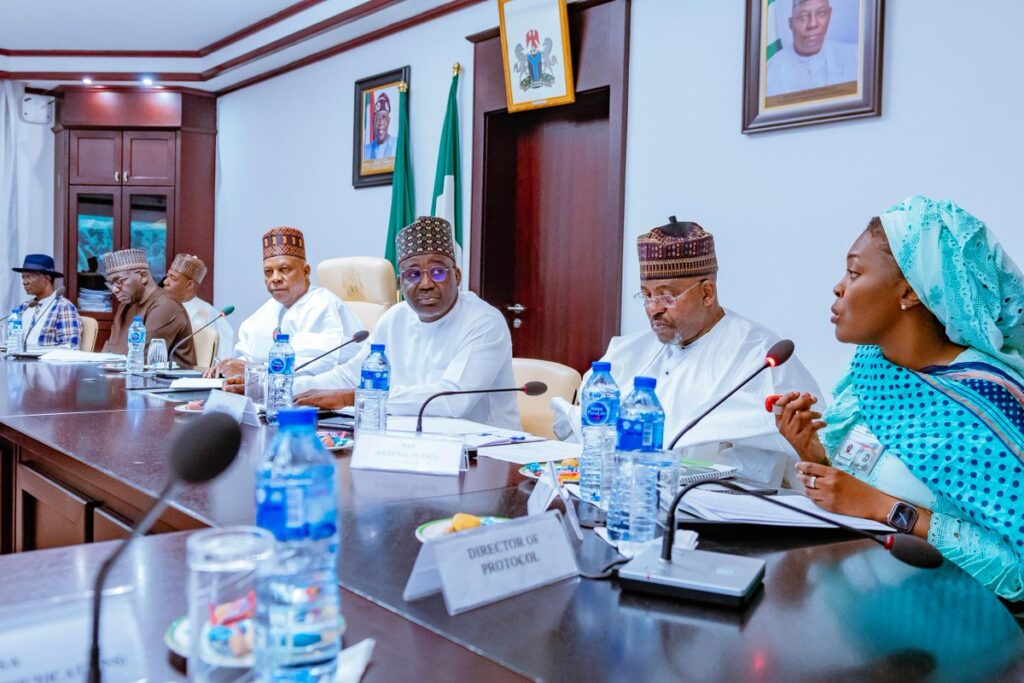Vice President Kashim Shettima has reaffirmed the federal government’s commitment to elevate Nigeria into the top 80 countries on the global Human Capital Index (HCI).
This ambitious goal, he said, aims to create a healthier, better-educated, and more empowered nation.
In a statement, Shettima’s spokesperson, Stanley Nkwocha said the Vice President emphasised that although it is challenging—this objective is achievable.
He urged Nigerians, particularly policymakers and community leaders, to actively support the Human Capital Development Programme.
Shettima made these remarks on Friday while launching the HCD 2.0 strategy at the Steering Committee meeting for the Human Capital Development Programme (HCDNigeria) held at the Presidential Villa in Abuja.
He said, “Our targets are ambitious, yet achievable. We aim to position Nigeria among the top 80 countries on the Human Capital Index, reaching a score of 0.6 by 2030.
“These metrics represent more than just numbers; they signify the real change in the lives of our people—access to quality healthcare, improved educational outcomes, expanded opportunities for meaningful employment, and a society that remains resilient in the face of global challenges.
“As we inaugurate HCD 2.0, I call on every Nigerian—policymakers, community leaders, and citizens alike—to recognise the stakes and embrace the promise of this initiative. Building a healthier, better educated, and empowered Nigeria relies on each of us contributing to a legacy of progress and possibility.”
The Vice President highlighted a pivotal moment in 2018 when Nigeria faced a sobering reality: the nation’s rankings on global human capital indices revealed significant gaps in health, education, and employment.
This urgent situation, he noted, spurred the government to make human capital development a national priority, resulting in the launch of HCD 1.0—a strategic initiative aimed at creating a healthier, better-educated, and more productive Nigeria by 2030.
Shettima described the recent launch of HCD 2.0 as the dawn of a new era. Building on the strong foundation established by President Bola Tinubu’s administration, this second phase of the Human Capital Development strategy aims to accelerate progress toward these essential national goals.
“This initiative represents far more than a programme. It is a national commitment, a promise to the well-being, empowerment, and productivity of every Nigerian. It embodies a vision that speaks to the aspirations of each citizen and affirms our shared goal: a healthier, more educated, and more inclusive Nigeria.”
Shettima stressed that the HCD 2.0 Strategy aims to ensure no Nigerian is left behind as the nation advances toward a more inclusive and sustainable society.
He highlighted the core pillars of this strategy, which include equitable and modern healthcare, an inclusive and functional education system, and the promotion of financial inclusion across the country.
“One of the core pillars of HCD 2.0 is equitable and modern healthcare. We envision a system that reaches every Nigerian, regardless of their location or economic standing. Through digital health platforms, innovative financing, and climate-resilient practices, we aim to create a healthcare system that serves all.
“Alongside healthcare, we are transforming our approach to education. We are committed to fostering an inclusive, functional education system that prioritises digital literacy, gender equity, and financial accessibility.”
“In an era of rapid digital transformation, Shettima emphasized that HCD 2.0 is strategically designed to bridge the digital divide and enhance financial inclusion across Nigeria.”
He noted that by advancing fintech innovations, expanding online banking, and strengthening digital payment systems, Nigeria is creating opportunities for every citizen to participate actively in the national economy.
Shettima further stressed that achieving the goals of HCD 2.0 requires a comprehensive governance framework, uniting federal and state leaders, private sector stakeholders, civil society, and development agencies.
He assured that, with the support of the HCD Programme Steering Committee, which he chairs, and the commitment of leaders from both public and private sectors, the federal government will implement the HCD 2.0 strategy smoothly and efficiently.
Meanwhile, Rukaiya El-Rufai, Special Adviser to Tinubu on the National Economic Council (NEC) and Climate Change, said the new programme is aimed at improving human capital outcomes through a focus on education, health, and workforce development, building on the successes of HCD 1.0.
“The HCD 2.0 Program is structured to elevate Nigeria’s Human Capital Index (HCI) and position the country to tackle both domestic and global challenges, including climate change and digital transformation,” El-Rufai said.
She underscored the importance of robust Monitoring, Evaluation, Accountability, and Learning (MEAL) frameworks to ensure transparency and effectiveness in tracking progress.
“We are committed to closing critical gaps in health, education, and labour force participation while promoting sustainability and inclusivity in all our efforts,” she added.



